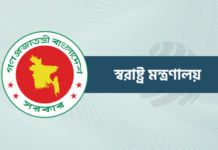
The cabinet on Monday approved the draft of the National Online Mass Media Policy 2017 to monitor and regulate online mass media, making registration with proposed National Broadcasting Commission mandatory for all internet-based radios, televisions and newspapers.
Media outlets already registered for publication of newspapers or licensed for broadcasting would, however, need no further registrations with the proposed commission to run their online news portals, according to the policy.
Each media outlet under the purview of this policy must have specific ‘charter of duties’ and editorial policy approved by the commission that would not go against the policy.
The information ministry placed the draft policy in the weekly cabinet meeting in the Jatiya Sangsad complex.
‘Newspapers registered under the Printing Presses and Publication (Declaration and Registration) Act 1973 would not need to get registered with the proposed broadcast commission for running their online versions,’ cabinet secretary Mohammad Shafiul Alam said at a briefing at the secretariat.
Televisions and radios having licences to broadcast would not need fresh registrations, he explained.
They would, however, need to inform the commission about their online editions in details, the cabinet secretary added.
He said that the information ministry would look after the matter until the broadcast commission proposed in the policy was established.
The provisions stipulated in the National Broadcasting Policy 2014 imposing restrictions on posting on the internet news and advertisements on the Wa for Independence, history, language,
cultural and religious sentiments, development activists, political and religious statements, consumer rights and woman and child rights would be applicable under the policy.
The online media policy drafted in 2015 empowered the proposed National Broadcasting Commission to coordinate and monitor online news portals.
It empowered the commission to issue show-cause notices to violators of the proposed policy and submit report to the government recommending punitive actions after holding probes into the violations.
The online media policy said that objective of the policy would be ensuring ‘accountability and freedom’ of the media protecting the rights of the people and individual citizens.
Almost similar objective was set out in the National Broadcasting Policy 2014, which drew widespread criticism for empowering the government to impose ‘draconian restrictions’ on publication and broadcasting of news and advertisements.
The online media policy proposed bringing all online media outlets under a comprehensive management.
The government in November 2015 asked publishers of all online newspapers to get registered with the Press Information Department under the information ministry.
At least 1,800 online media outlets have so far applied for registrations, the cabinet secretary said.
Source: New Age









